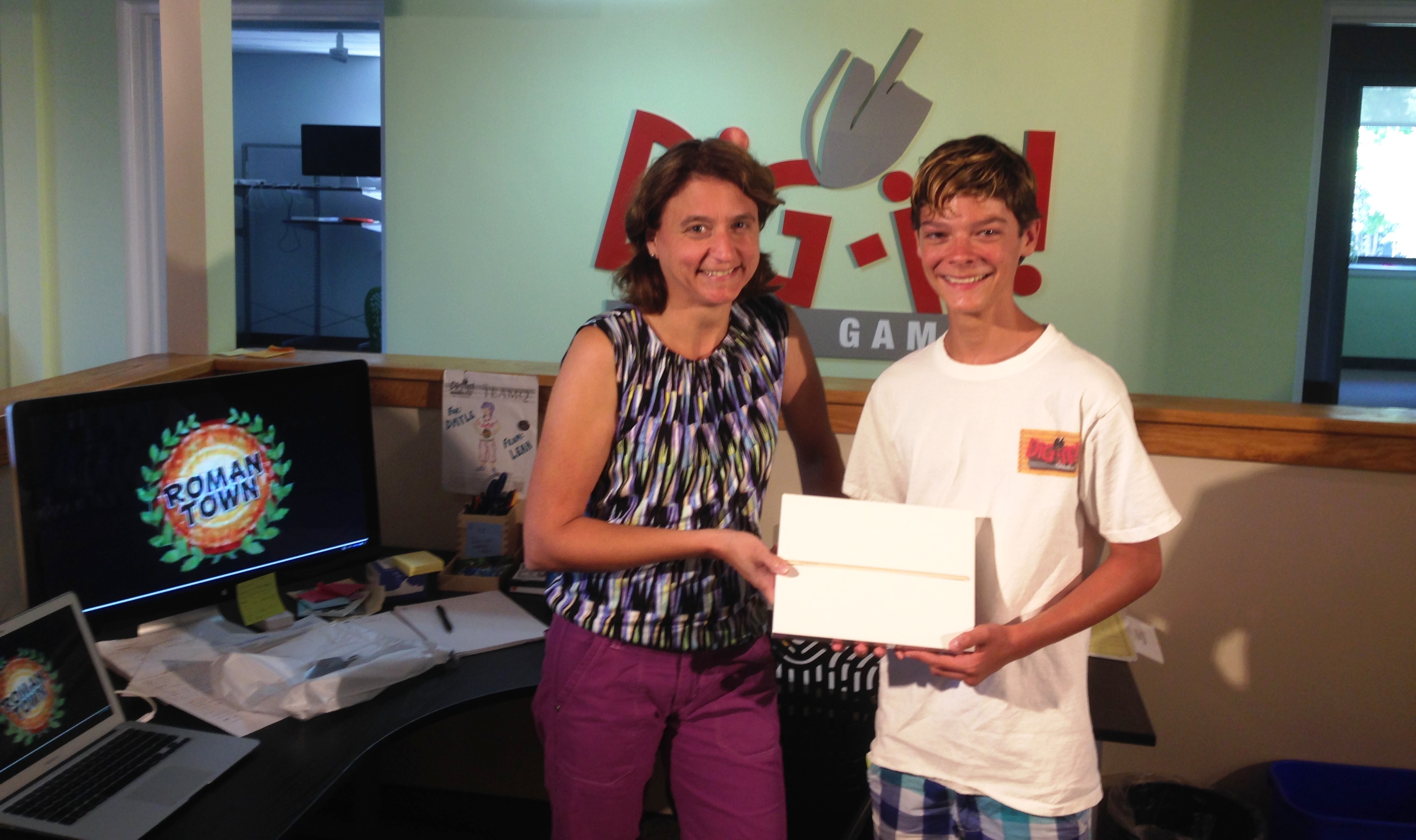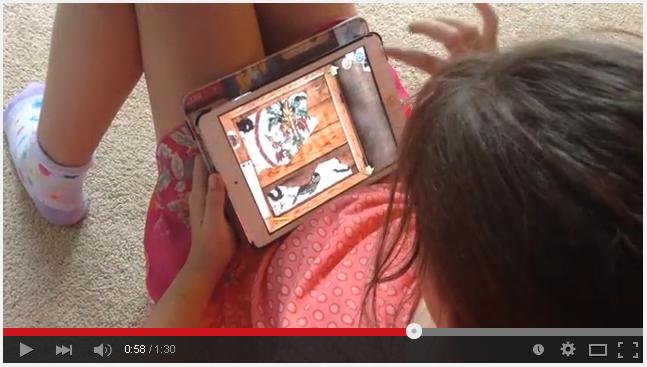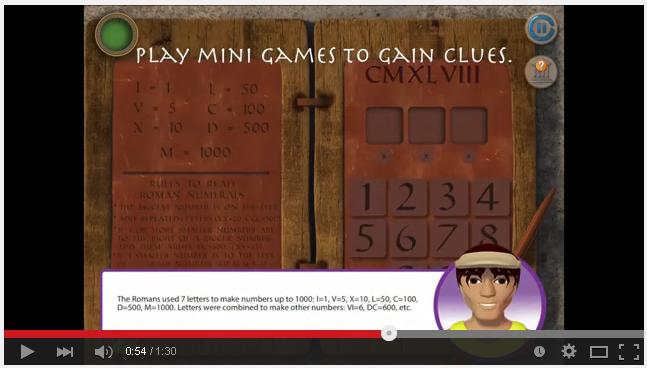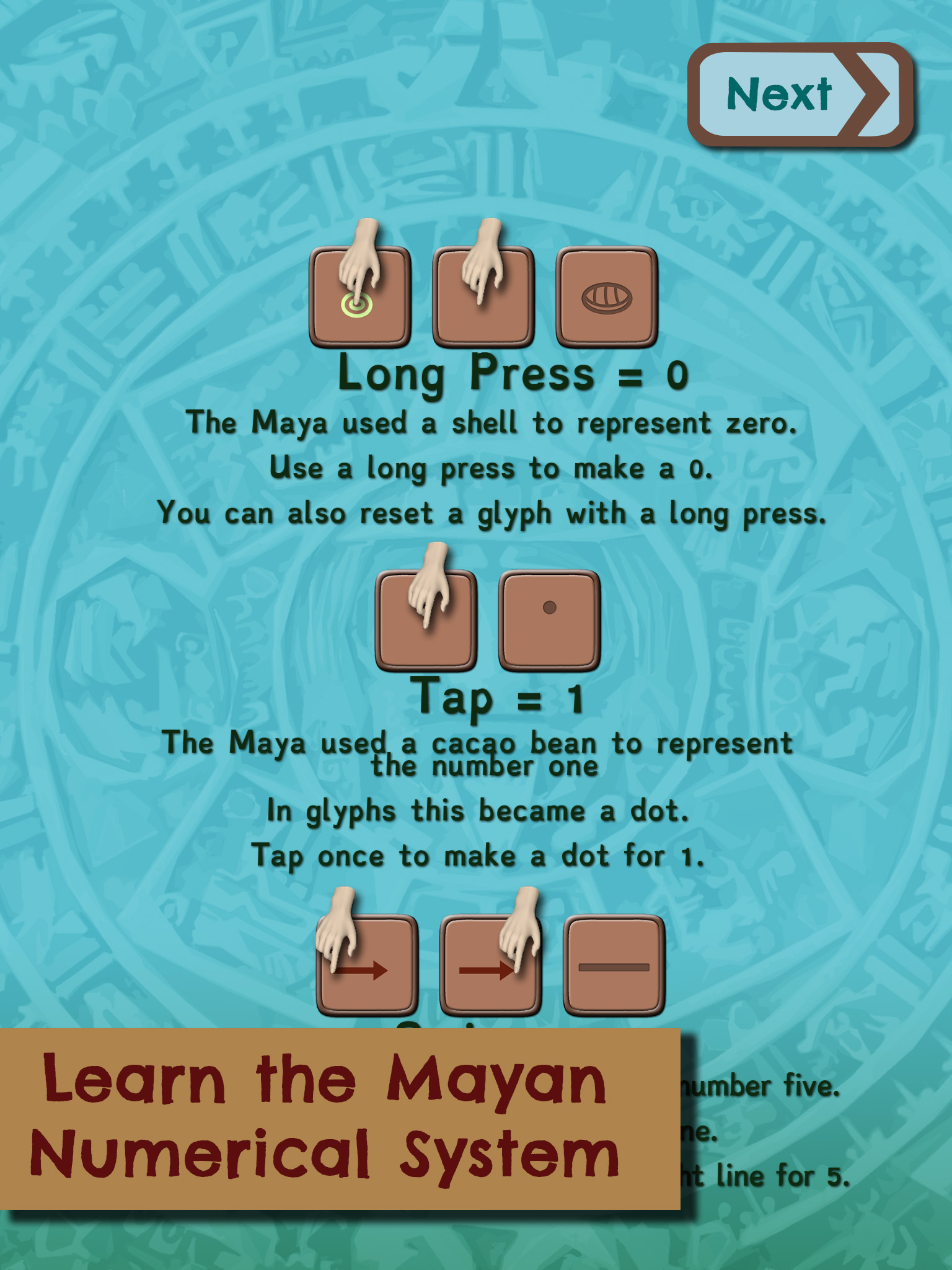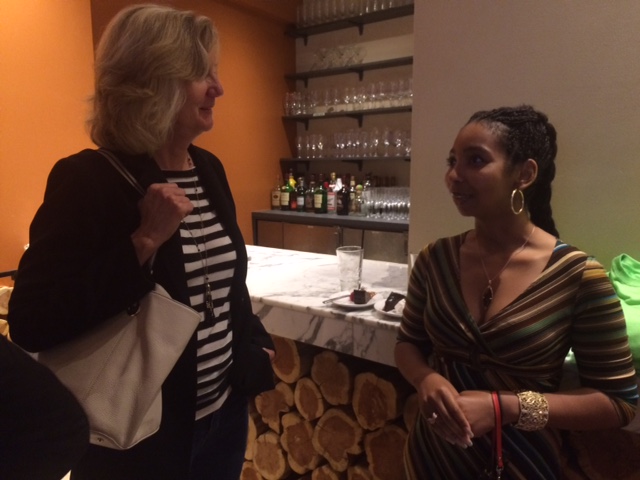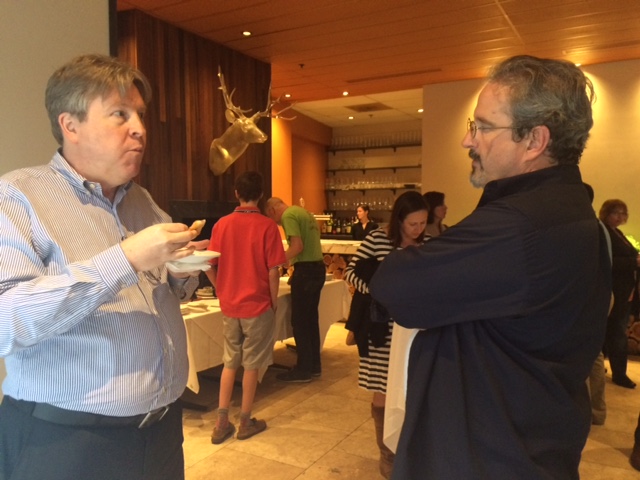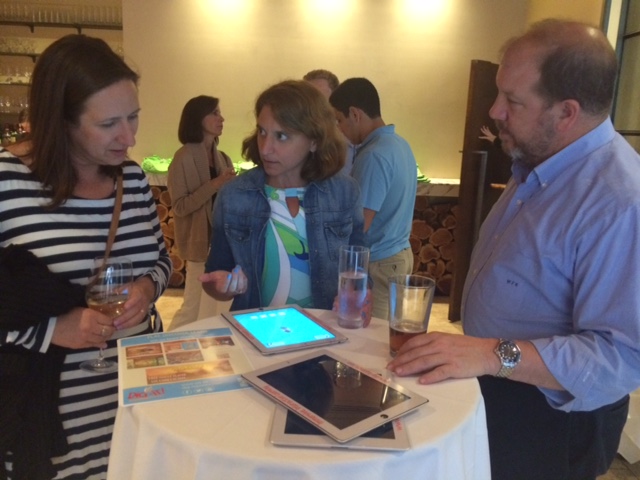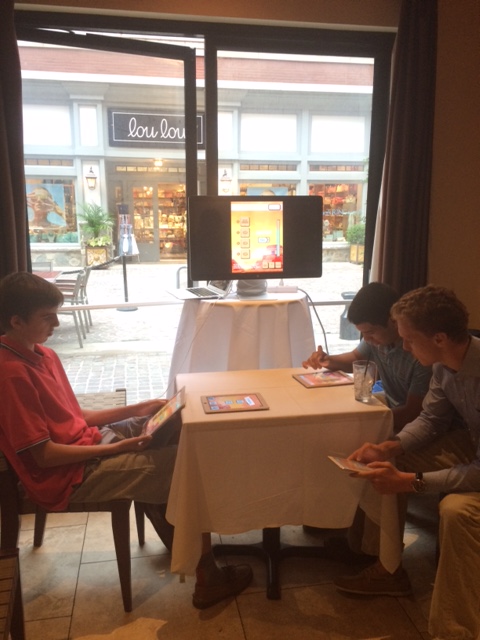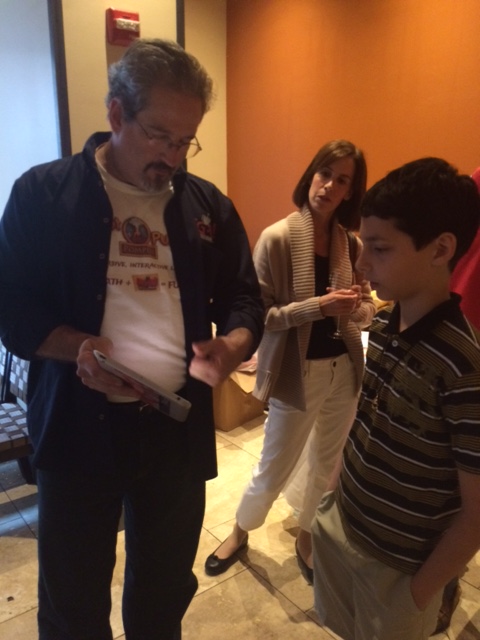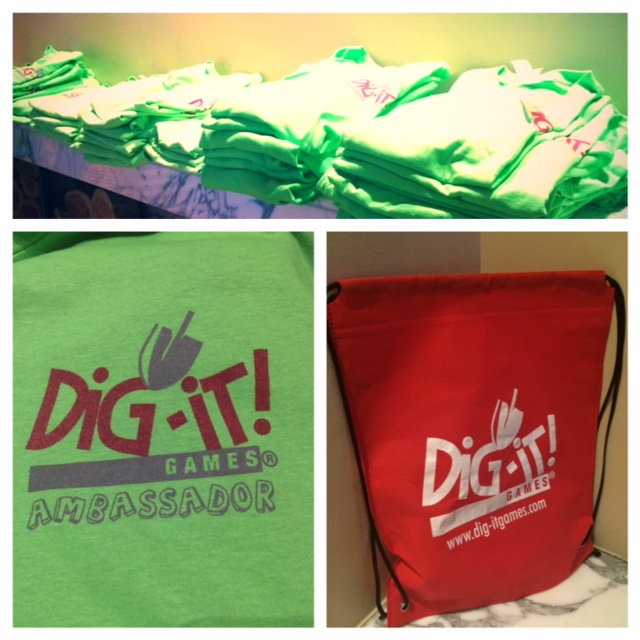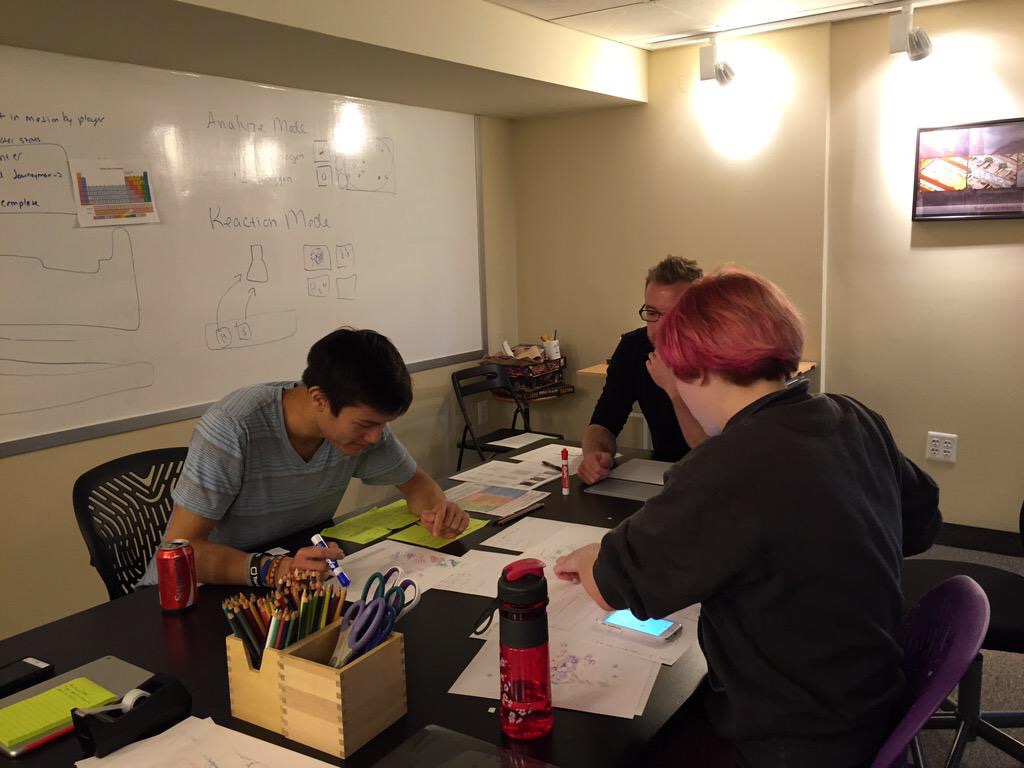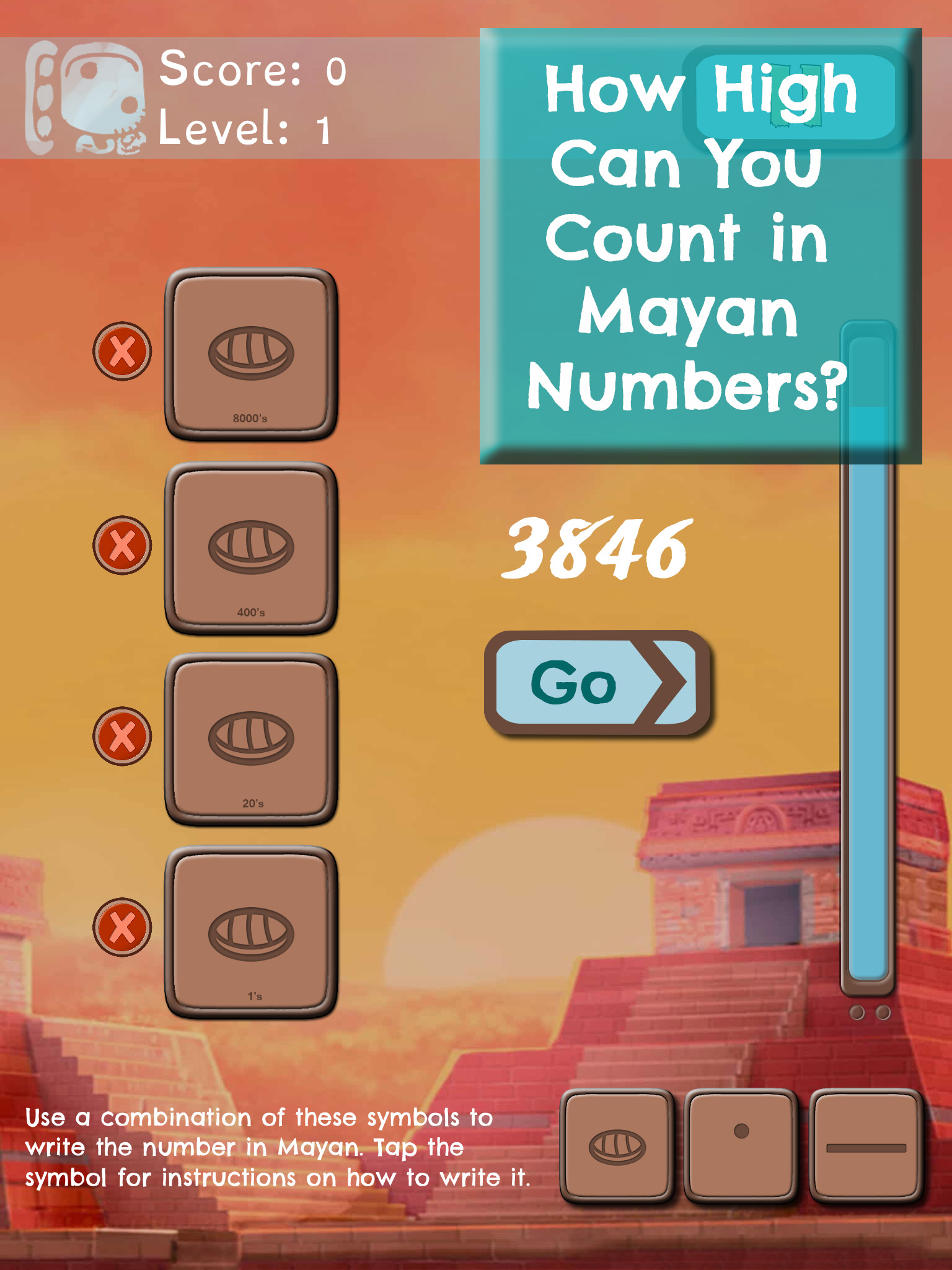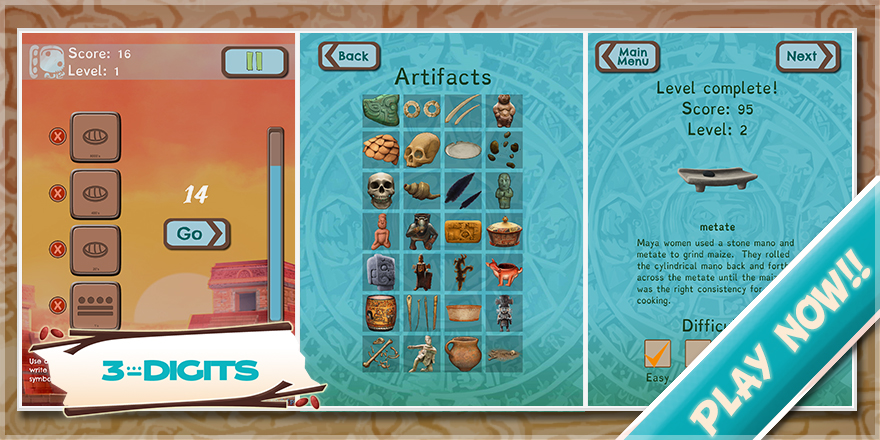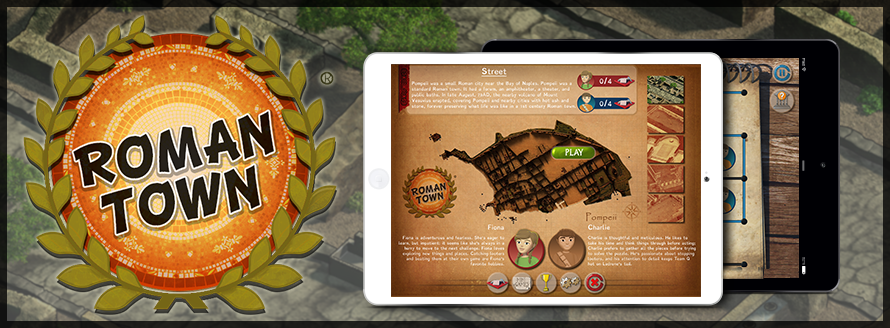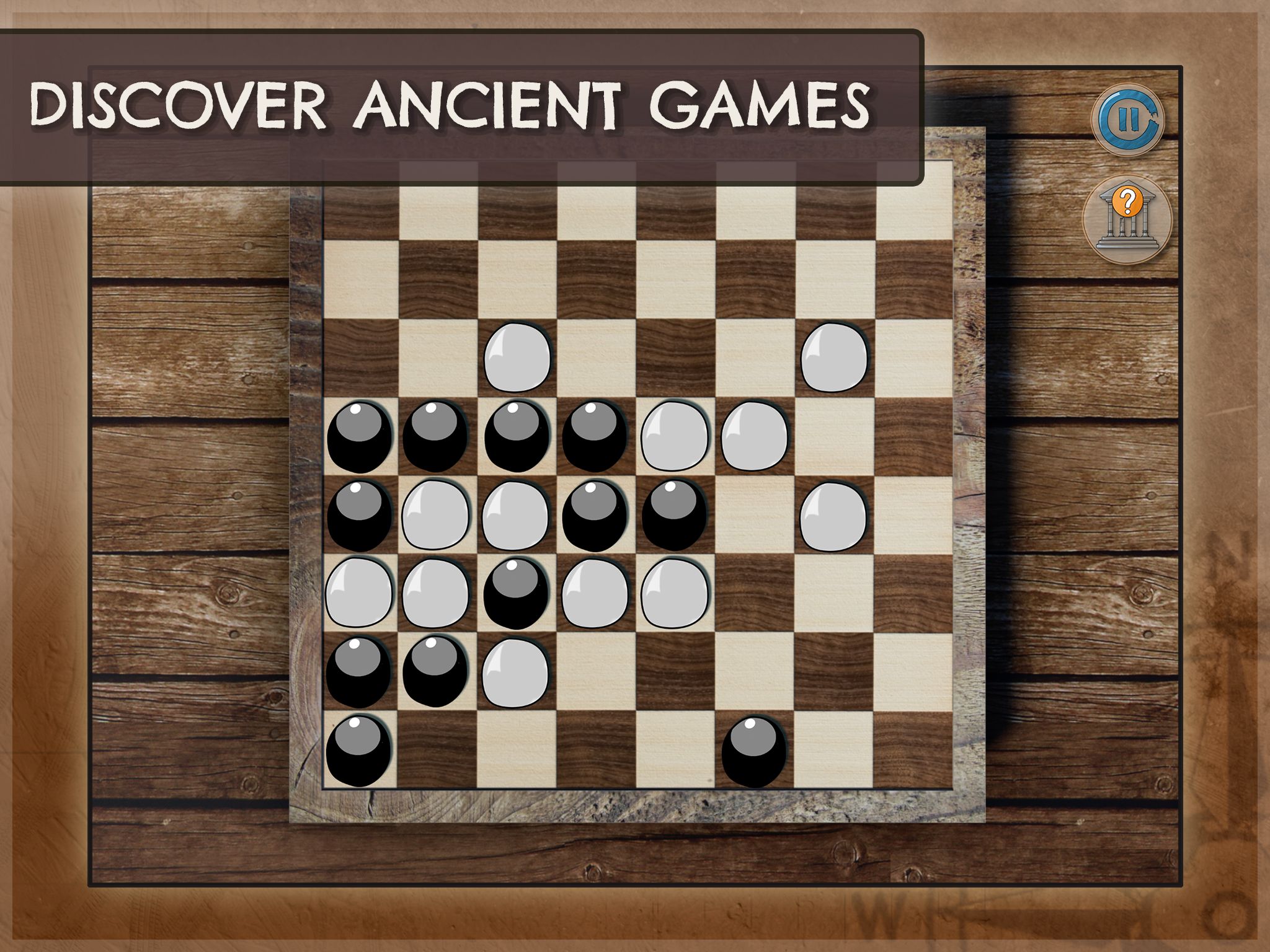Creative & Talented: Meet Nicolas Baker, Winner of the Roman Town Video Trailer Contest
Last month, the Roman Town™ Video Trailer Contest came to an end when the talented and innovative Nicolas Baker was chosen as Dig-It! Games’ winner. Since then, he’s visited the studio and hung out with the Dig-It! Games team, received the prize of an iPad, and downloaded it with all of Dig-It! Games’ apps. We spoke with Nicolas, 14, about his creative process and what he loves about our games.
How did you develop your entry for the Roman Town Video Trailer Contest?
I started to brainstorm story ideas. At first, I had this idea for a spy mission, in which spies are trying to steal the iPad with the game on it. Then I realized that the storyline took too much time, so I decided to focus on screenshots of the game.
I used Final Cut Pro at school in the media lab. The contest was announced after final exams were over, so I spent class time working on the project, as well as after school. I did ask my media teacher for any additional editing software for the iPad, but the iMovie app did not give me as much freedom as I wanted.
I used screenshots of the game itself mixed with A-Roll of my sister and dad playing Roman Town. I wanted to give the audience a clear indication of who was playing the game, so I used an above the shoulder shot with my sister to show it was a young child and which game was being played. Then with my dad, I wanted them to know it was an adult—but they already knew the game, so I could just show him without the iPad screen.
How much time did it take you to finish the project?
Working one day each week, it took me about a month to complete.
Do you want to be a filmmaker when you grow up?
I’ve spent three years of my middle school experience learning about media production and video editing, but I’m really interested in animation and art. I’d like to be an animator for Disney. After I did this project, it got me more interested in video editing and I’d like to take those skills, along with web and graphic design, to start a freelancing business.
What made you want to enter the contest?
I got the e-mail announcing the contest. I’ve known about Dig-It! Games for a while. I like their apps—they’re cool and fun. I realized I had plenty of experience to make a great trailer; it gave me the chance to take my learning experience and put it into a professional game trailer.
How did you feel when you won?
I was at the pool when I found out. I was checking to see if my parents were in touch, saw the subject line of the e-mail which said Congratulations, and I was really excited. I wasn’t sure if I’d gotten first place or second place at the time, but then I read through the entire e-mail and was ecstatic.
How did your parents react?
I called them and my mom first thought I was joking, but then I read through the whole e-mail with them. They’re proud of me.
What’s your favorite mini-game in Roman Town?
My favorite subject at school is math, so I like the translate Roman Numerals game.
Would you be interested in becoming an artist at Dig-It! Games someday?
I really like the studio. Winning was the third time I’ve been there. I was able to talk to the artists and game designers, and they got to show me some of their animation software. I’d like to intern at Dig-It! Games or work part-time when I get older.
We’re Bringing Student-Produced Games to Life!
Dig-It! Games is proud to announce the release of their newest app, Wheatley Days: a compilation of student projects by sixth, seventh and eighth graders. The free iOS app is the product of a partnership with the Wheatley Education Campus in Washington, DC. The app includes 18 levels of student-produced game prototypes and 3D artwork that allows users to view the creativity and innovation that the middle school students demonstrated during a recent visit to the Dig-It! Games studio.
In April 2015, 73 sixth, seventh and eighth grade students from DC Public Schools’ Wheatley Education Campus participated in field trips to the Bethesda-based game development studio. Students were tasked with designing a game level prototype based on a provided template. They started the day with brainstorming sessions where they collaborated on the design for a maze-game prototype. Dig-It! Games developers then built the prototype to the students’ specifications, working to bring these games to life exactly as the students envisioned them, with varying degrees of difficulty, unique obstacles, and storylines.
The students learned to manipulate the code used to build the prototypes and used 3D software to build and customize one of the in-game objects.
“There’s no question that this experience changed these kids’ perspectives on technology,” said Suzi Wilczynski, Founder and President of Dig-It! Games. “From the start of their visit, it was obvious that the kids were reevaluating the games and devices they use everyday.”
Wilczynski feels the most important take-away for students was in the empowerment of knowing that they made a real, playable game. The experience transformed their thinking from a vague idea of game development into a new perspective of what they are capable of, both inside and outside the classroom.
“Students who initially thought coding involved too much math finished the day considering a career in programming,” said Wilczynski. “Quiet students blossomed when put in charge of a gamified version of project management. Geometry and art came together and suddenly cones, cylinders, and vectors jumped off the worksheet page and became real things to be manipulated to form objects. It was remarkable to watch these kids as their perspective on STEM changed dramatically in a matter of hours.”
Wheatley Days combines the 18 individual student-imagined game prototypes with the 3D artwork the students created into a free iOS app. The prototypes are based on a maze mini-game in Dig-It! Games’ Roman Town™ app. Students were shown how a few simple code changes can turn an everyday maze game into an avoid-the-walls challenge or a fun platformer. They were able to choose the layout for their prototype and collaborated with their teammates to decide on the level of difficulty and storyline of the game.
“The students really enjoyed being able to make something tangible,” commented Wilczynski. “The most exciting part of the day was when they got to play the game they made. The pride they took in showing their game to their classmates was palatable.”
The field trips with Wheatley Education Campus represent one component of Dig-It! Games’ school outreach programs. The company is committed to working with and inspiring middle school students through field trips, school visits to tech-based clubs, science fair participation, studio open houses, interactive game launch events, and beta testing opportunities.
“Hands-on STEAM experiences like the Wheatley Education Campus field trip can motivate kids towards careers they had not previously considered; beyond that, it provides a group of students with skills that directly transfer to the real world, including collaboration, delegation and persistence,” said Wilczynski. “As we consider the upcoming academic year, we’re looking to take this experience and make it available for more students on both a local and national level.”
A Commitment to Learning for All
As an educational gaming company, our goal is to help kids learn—and to help them discover a love of learning. We know that every child is different and that what works for one child to learn may not work for another. Sometimes barriers get in the way; a number of factors—from learning disabilities to struggles outside of school—can influence how a child performs in the classroom. We strive to incorporate features within our games that encourage struggling students to persevere and continue playing.
That’s why, when we heard about Dyslexie, a revolutionary font that helps individuals with dyslexia read with ease, we reached out.
Dyslexie ensures that each letter and character has a distinct form, so that it is simple to distinguish individual letters from others. Text often confuses students with dyslexia; letters are jumbled or turned around because of their similarity. Dyslexie simplifies the text and helps readers make far fewer errors than they would while reading a regular text.
With that in mind, we made the conscious effort to remove this barrier for our players. We released 3 Digits ™ last month—the first of our apps designed exclusively with the Dyslexie font. Dig-It! Games™ is committed to using Dyslexie across all new products and will revisit previously developed apps for updates to incorporate the unique font. The use of the Dyslexie font opens up our games to a whole new group of students—and we plan to make learning fun for each one of them.
Great Games, Good Friends: Celebrating Roman Town and 3 Digits
Last week, the Dig-It! Games™ team invited family and friends—including our Ambassadors—to stop by Redwood, a local restaurant, and celebrate a belated launch party of both Roman Town™ and 3 Digits™. With a spread of delicious appetizers and fabulous Dig-It! Games swag, the party was an absolute blast! We kicked it up a notch with an intense 3 Digits competition.
Interns, Ambassadors, and guests had a chance to try their hand at the app to compete for the highest score in a variety of categories. We didn’t go easy on these players—all categories were at the medium or expert difficulty level.
We’re proud to officially announce the winners:
Expert Difficulty Aged Under 16
Matt Schneider – 471,982
Medium Difficulty Aged 16+
Marcelo McAndrew – 3,372
Expert Difficulty Aged 16+
Greg Frock – 152,183
One of our competitors discovered a bug in the game (it has since been fixed and resubmitted to Apple). Unfortunately, during play, his score was negatively affected. His score—at the time of the bug—was high enough that he may have won the contest had the bug not appeared. Therefore, we’re also considering Fordon Miller a winner.
Each winner will receive $20 in Apple gift cards. To collect prizes, please email our producer, Dayle Hodge, at dayleh@dig-itgames.com to arrange pickup.
Happenings in the Studio—Ready to Game?
Happy Friday! It’s a holiday weekend—the last one before school’s out for summer—and we’re so excited to share with you a little bit of what’s happening here at Dig-It! Games. First, our intern Bo (you may have noticed his icon in the credits of Roman Town and 3 Digits) has finished up his semester with us. It’s been fantastic to have him with us, sharing his talents with the team! Second, we’re getting ready to head to Content in Context from June 1-3, where Mayan Mysteries is up for a REVERE award. Plus, our team is already hard at work on our next project (hint: science) and planning for Summer Learning Day in June.
If you’re looking for fun this weekend, check out our newest app 3 Digits—here’s 3 reasons why:
- Players can adjust the game for their individual difficulty level.
When it comes to math, second graders are just starting on their multiplication journey while eighth graders have mastered mental math skills and are beginning to wrestle with algebra. With 3 Digits, students must translate numbers into Maya glyphs using skills like addition and multiplication. The higher the number, the more difficult the translation.
For younger players—or players just getting started—the easiest level only goes up to the number 19. For more experienced players—or those looking for a challenge—the most difficult level introduces numbers up to 150,000. How high can you translate?
- Discover artifacts of the ancient Maya culture as you go.
3 Digits isn’t just asking players to think differently about math; the game also encourages exploration of the Maya culture. As players earn points and complete levels, they unlock different artifacts found in archaeological sites like Tulum (where our first Loot Pursuit series game is set) and can learn more about each item. The more problems players solve, the more their collection grows!
- Teachers can easily implement 3 Digits as a classroom resource.
Whether students are learning about the Maya or reviewing multiplication skills before an exam, 3 Digits allows players of all ages to consider math differently. Because the Maya used a base 20 number system, 3 Digits encourages kids to think outside the box, problem solve, and grow their mathematics skills. It can be played for just a few minutes, or can be practiced for a longer period of time—it’s perfect for a brain break or use in a center rotation model.
So take out your iPad, visit the App Store, and download 3 Digits for free today!
Teachers, Partner with Us for Student Success
Being a teacher is not an easy job. Days are spent on your feet, nights are spent grading papers, and lesson planning usually happens on weekends. It is also an emotional job—connecting with students, learning about their lives, and building trusting relationships.
But being a teacher is rewarding. Check out this recent survey reported by T.H.E. Journal in which 1,002 K-12 teachers were polled about their jobs. Nearly three quarters (71 percent) said that seeing students grow is what they most enjoy about the job. More than half (68 percent) of those who entered the field in the last 10 years said they would recommend the profession to others.
As the field of education continues to change in vast ways—including the integration of technology and play in the classroom—Dig-It! Games wants to recognize educators for their work and ask them an important question: What do you want?
At the recent Games for Learning Summit, U.S. Department of Education Director of Educational Technology Richard Culatta discussed the future of gaming for education. “Part of the message we are trying to send here is, if you’re building and designing games for learning, you have to connect and work with teachers and with school leaders to make sure you are building games that are meeting the needs,” he said.
We deeply care what educators think of our games. We invite teachers to Open House events or welcome them to stop by the studio to test our products. We’ve incorporated their feedback into games you see in the App Store today.
Our website offers lesson plans for both Mayan Mysteries and Maya Numbers. We are also preparing to launch a Pinterest page that we hope will make it easier for teachers to implement game-based learning in the classroom.
Last month, we hosted classes from Wheatley Education Campus in our studio. We taught game design to these students and had the chance to speak with their teachers. We would love to have other classes visit (just let us know at info@dig-itgames.com) to help them collaborate, learn about educational game development and build their own apps.
Now, we want to know what teachers are thinking; how they would like to use our games in the classroom; what games they’re looking for in the market. We want teachers to help us design the games we create—not just test them. We want to talk with teachers about the content within our games, to emphasize its accuracy and that our games meet the standards that teachers are looking for.
If you are a teacher, we thank you for all you do to encourage students to love learning and become critical thinkers and problem solvers. That’s our mission, too. We value your perspective, so contact us—let’s get together to help our students succeed.
In the meantime, we know that 91 percent of teachers spend their own money (NPD Group) on supplies and resources in the classroom. For Teacher Appreciation Week, we’re offering some of our most popular educational games at a discount. If you visit the App Store today through 5/15, you’ll see that 3 Digits, Roman Town, Mayan Mysteries, Loot Pursuit: Pompeii and Can U Dig It! are all $0.99 for the full app—including all in-app purchases. Help blend fun and learning for your students!
Translate Maya Numerals and Think Differently About Math with New App from Dig-It! Games™
Today, we’re excited to release a new game for all ages, 3 Digits: Translate Maya Numerals And Think Differently About Math!TM The new app challenges players’ critical thinking and math skills while teaching the ancient Maya’s revolutionary number system.
3 Digits turns math skills-building into a fun, fast-paced learning game that encourages players to think outside the box using addition, subtraction, and multiplication. The app, free to download via the iTunes App Store, immerses players in the base-20 Maya number system. A detailed tutorial introduces glyphs used for the three Maya digits: a shell for zero, a dot for 1 and a line for 5. Players can choose from four levels of difficulty based on their experience and the age of the player. At the easiest level, players only receive numbers up to 20. At the most challenging level, the numbers will reach 150,000.
“Games like 3 Digits allow players of all ages to hone skills and discover new information in a way that blends both fun and learning,” said Suzi Wilczynski, founder and president of Dig-It! Games. “A first grader, middle school student, and an adult can each play 3 Digits at an age-appropriate difficulty level, allowing for a family-friendly educational experience that challenges its learners to think differently about our number system.”
In either timed or untimed mode, players are presented with randomly generated numbers to convert into ancient Mayan glyphs. 3 Digits offers children and adults the unique opportunity problem-solve using place value, inherently testing and improving their math skills. Designed exclusively for the iPad, this companion app to Dig-It! Games’ award-winning Mayan Mysteries™ game provides an entertaining and educational experience.
Meant to be played casually or used as a fun, engaging classroom supplement, 3 Digits is the latest app from Dig-It! Games to address the educational needs of students and is free to download on the iTunes Store. Roman Town™, Artifact Snatch™, Loot Pursuit: Pompeii™, Loot Pursuit: Tulum™, Mayan Mysteries, and Can U Dig It! ™ cater to the learning needs of middle school children. All six iOS apps are free to download through the iTunes store. Maya Quiz™, a companion to Mayan Mysteries, is available for purchase on the iTunes store.
5 Reasons to Play Roman Town™
Five years ago, we released on CD-ROM our very first educational game, Roman Town, which received critical acclaim from parents, educators, and students. On Tuesday, we celebrated Rome’s 2,768th birthday with the release of a new modern version of the game, now available for free download on the iPad.
Game development has come a long way in five years, particularly as technology has continued to evolve in education and tablets have become more mainstream (almost 40% of educators use tablets for game access, according to the Joan Ganz Cooney Center)
Whether you’re in the classroom or at home, the team at Dig-It! Games is excited for you to play our newest app, and here are our top five reasons why:
- Roman Town brings history to life.
History is not about fact-memorization and dates; it’s about the culture and learning how people lived in the ancient world. Roman Town is a part of our goal to make history come alive for students, and with its basis in accurate and detailed information, the game allows for players to become immersed in the culture while being entertained. Through conversations with characters, players will learn facts and accurate information about the ancient Roman culture.
- Don’t worry teachers, it’s aligned to standards!
Roman Town’s completely authentic content aligns to National Council for the Social Studies Curriculum Standards, World History Standards, and Common Core State Standards for Language Arts and Mathematics. If you’re an educator planning a unit on Romans, this game is perfect for your students. It can be played through in just a few hours and can be assigned as homework or weaved into your lesson plan as an in-class activity. Learn more about standards here.
- There are 11 different games, and two of them are based on real games the ancient Romans played.
Have you ever played Jacks or Connect 4? That’s what Knucklebones and Calculi are like, just the ancient versions. We’ve made it a little more challenging. In Calculi, you aim to get five in a row before your opponent. In Knucklebones, a game of probability, you guess your future sum and roll the dice marked with Roman numerals to determine the total. If you guessed right, you win the round. Additional games include Artifact Identification, Dots and Boxes, Roman Numerals, Concentration, Code Breaker, Jigsaw, Pipes and Maze.
- Play as either Fiona or Charlie to explore the ruins of Pompeii—the games you play will match the character’s personality.
Fiona is adventurous and fearless, always in a hurry to move to the next challenge. Catching looters and beating them at their own game are Fiona’s favorite hobbies. It’s no wonder that the games Fiona plays are timed—she’s impatient and ready for what’s coming next. Charlie is thoughtful and meticulous. He likes to take his time and think things through. When playing as Charlie, you’ll need to beat puzzle- and logic-based games. You must play as both characters in order to reach the end of the game.
- Collect clues with Team Q to discover the location of Ladrone, the notorious thief from Mayan Mysteries.
Each tourist holds a clue left behind by Ladrone, but they won’t give it you easily. In order to earn the clue, you—as Fiona or Charlie—must beat the mini-game the tourists present. If you don’t win, you can try again. As you collect clues, the picture will become clearer to identify Team Q’s next mission. Where is Ladrone headed? We’re not telling; play Roman Town to find out!
History Meets Game-Based Learning in Highly-Anticipated Roman Town™ App from Dig-It! Games™
On the legendary birthday of the ancient city of Rome, we’re thrilled to officially release the brand new version of the original, award-winning Roman Town game. Roman Town™, now an app for iOS 8 devices, is a social studies-based, problem-solving game that guides players through the ruins of the archaeological site of Pompeii to play challenging mini-games, discover clues, and explore the ancient Roman culture.
The interactive educational game engages middle grade students in the ancient civilization through conversations with characters, exploration of the ruins, and artifacts woven into its mini-games. Designed primarily for players 10-15 years old, Roman Town creates a deeper learning experience that features:
- Detailed factual information about Roman history, culture and artifacts;
- An active, engaging storyline for immersive learning;
- 11 interactive mini-games, including Knucklebones and Calculi, which are based on real games the ancient Romans played;
- Beautiful, realistic graphics that transport players to Pompeii;
- Download for free on iPad.
“History is not about fact-memorization and dates; it’s about the culture and learning how people lived in the ancient world,” said Suzi Wilczynski, President and Founder of Dig-It! Games. “Roman Town is a part of our goal to make history come alive for students, and with its basis in accurate and detailed information, the game allows for players to become immersed in the culture while being entertained.”
In this educational game designed exclusively for the iPad, Fiona and Charlie—the popular characters from Dig-It! Games’ series of top-rated games—partner with players to collect clues leading them ever-closer to the location of Ladrone. Featuring two play modes, students must beat both timed and untimed mini-games in order to earn clues from tourists in the ancient Roman city of Pompeii.
Anna, the winning character of the Mayan Mysteries Drawing Contest, acts as a guide to Fiona and Charlie, with the objective to keep the pair out of trouble.
Released five years ago to acclaim for parents and educators, the original CD-ROM Roman Town won several awards including Creative Child Magazine Game of the Year, National Parenting Publications Awards Honors, Common Sense Media On for Learning Award, and the National Parenting Center Seal of Approval.

